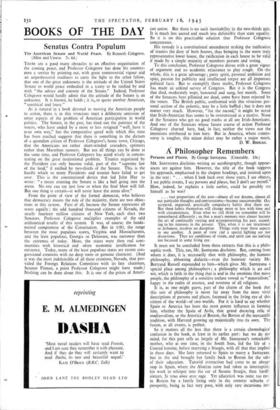BOOKS OF THE DAY
Senatus Contra Populum
THERE are a good many obstacles to an effective organisation of the coming peace, and Professor Colegrove has done his country- men a service by pointing out, with great controversial vigour and an unprofessorial readiness to carry the fight to the other fellow, that one of the great unknowns is the attitude of the United States Senate to world peace embodied in a treaty to be ratified by and with " the advice and consent of the Senate." Indeed, Professor Colegrove would hardly admit that the attitude of the Senate is an unknown. It is known, he holds ; it is,. to quote another American, " unethical and lousy."
As is natural in a book devoted to moving the American people to action, there is in this vivacious tract a deliberate omission of other aspects of the problem of American participation in world, politics. The Senate, in the past, has tired out the patience of the voters, who have ended by a more or less resigned "well, have it your own way," but the comparative speed with which this state has been reached suggests that there is something in the dictum of a quondam citizen of Professor Colegrove's home town, Chicago, that the Americans are rather short-winded crusaders, sprinters rather than Marathon runners. But not all things can be done at the same time, and Professor Colegrove has acted wisely in concen- trating on the great institutional problem. Treaties negotiated by the President can only become valid, part of the " supreme law of the land," if ratified by two-thirds of the Senate. This is the hurdle which so many Presidents and treaties have failed to get over. This is the constitutional device that led John Hay to write: " a treaty entering the Senate is like a bull going into the arena. No one can say just how or when the final blow will fall. But one thing is certain—it will never leave the arena alive."
From the point of view of the formal democrat, who believes that democracy means the rule of the majority, there are two objec- tions to this system. First of all, because the Senate represents all states equally ; the odd hundred thousand citizens of Nevada, the nearly fourteen million citizens of New York, each elect two Senators. Professor Colegrove multiplies examples of the odd arithmetical results of this system. It was, of course, the funda- mental compromise of the Constitution. But in 1787, the range between the most populous states., Virginia and Massachusetts, and the least populous, Georgia or Delaware, was narrower than the extremes of today. More, the states were then real com- munities with historical and often economic justification for existence. Today, many of the least populous states are recent con- gressional creations with no deep roots or genuine character. (And it was the most indefensible of all these creations, Nevada, that pro- vided the Foreign Relations Committee with its late chairman, Senator Pitman, a point Professor Colegrove might have made.) Nothing can be done about this. It is one of the prices of Ameri-
can union. But there is no such inevitability in the two-thirds rule. It is much less sacred and much less definsiNe than state equality So it is on this practicable solution that Professor Colegrove concentrates. •
His remedy is a constitutional amendment making the ratification of treaties the duty of both houses, thus bringing in the more truly representative lower house, the ratification in each house to be valid if made by a simple majority of members present and voting.
To this conclusion, Professor Colegrove drives with a great vigour of argument and no academic reluctance to play rough. On •the whole, this is a great advantage ; party spirit, personal ambition and spite, passion for publicity and intellectual torpor are all important political facts. But to exemplify these truths, Professor Colegrove has made an unkind survey of Congress. But it is the Congress that died, moderately wept, honoured and sung, last month. Some of the Senators here pilloried are dead, some tiave been rejected by the voters. The British public, confronted with this vivacious per- sonal section of the polemic, may be a little baffled ; but it does not matter very much. However, "for the record," it might be noted that Irish-American bias seems to be overstressed as a motive. None of the Senators who get no good marks at all are Irish-Americans. And one of the Senators whose future course of action Professor Colegrove charted here, had, in fact, neither the views no the intentions attributed to him here. But in America, where contro- versy is rougher, this minor defect may be rather a major merit.
D. W. BROGAN.


























 Previous page
Previous page